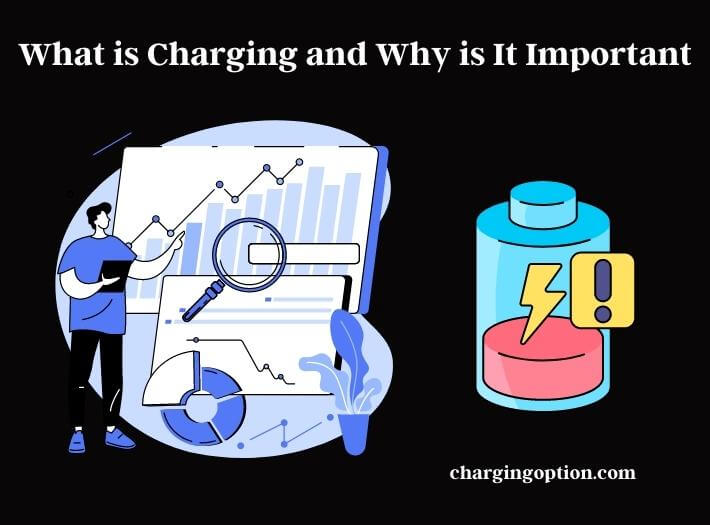Published on: April 22, 2024
Written by Firuj Hashem / Fact-checked by Rizbi Neyaj
The world we live in today is dominated by technology, and the importance of reliable charging technology has never been more apparent. Our smartphones, laptops, tablets, electric cars, and even wearable devices all rely on batteries to power them. As our devices become more powerful and capable, the need for faster and more efficient charging technology grows.

Charging technology has come a long way since the early days of wired charging. We have seen the rise of wireless charging, and with it, new charging standards and protocols. The industry is constantly evolving, with new advancements in charging technology emerging all the time.
What is Charging and Why is It Important?
Charging refers to the process of replenishing the electrical energy stored in a battery or other energy storage device. It is important because electric vehicles, electronic devices, and renewable energy systems rely on batteries to store energy for use when needed.
Without charging, these devices would eventually run out of power and become unusable. Charging is also important because it allows us to use renewable energy sources like solar and wind power to generate electricity and reduce our dependence on fossil fuels.
Charging is a critical part of the functioning of modern electrical systems and enables us to use clean energy to power our daily lives.

Current State of Charging Technology
There are two types of charging systems: wired charging and wireless charging. Wired charging is the most common and has been around for decades. USB is the most widely used charging standard for wired charging. USB has undergone several iterations, and the latest USB 4 standard supports power delivery of up to 100W.
Wireless charging has gained popularity in recent years, and the most common wireless charging standard is Qi. Qi charging uses magnetic induction to transfer power from a charging pad to a device. Other wireless charging standards and protocols include Powermat, AirFuel, and Rezence.
Fast charging technology allows devices to charge quickly without overheating. Quick Charge, Super VOOC, and Dash Charge are examples of fast charging technology.
Low-power charging is also becoming popular, with trickle charging and adaptive charging technology becoming more common. Trickle charging provides a low current charge to the battery, which helps to extend its life. Adaptive charging technology adjusts the charging current based on the device’s battery health and charging status.
Wireless charging technology is improving. Spatial freedom, higher power transfer, and charging multiple devices at once are all becoming possible with advancements in wireless charging technology. These advancements are being driven by the demand for more convenient charging solutions.
Advancements in Charging Technology
As technology continues to evolve, so does charging technology. Here are some of the most significant advancements in charging technology in recent years:
GaN Chargers
Gallium Nitride (GaN) chargers are an alternative to traditional silicon-based chargers. They are smaller and more efficient, resulting in faster charging times and reduced heat generation. GaN chargers can provide higher power output in a smaller form factor than silicon-based chargers.
Solid-State Batteries
Solid-state batteries are a promising new technology that can provide higher energy density and faster charging times than traditional lithium-ion batteries. Solid-state batteries use a solid electrolyte instead of the liquid electrolyte used in traditional batteries. This technology is still in the early stages of development, but it has the potential to revolutionize the charging industry.
Wireless Charging at a Distance
Recent advancements in wireless charging technology are enabling charging at a distance. This technology uses radio waves to transfer energy, allowing devices to charge without being in physical contact with a charging pad. This technology is still in the early stages of development, but it has the potential to revolutionize the way we charge our devices.
Fast Charging
Fast charging technology has been around for a while, but recent advancements have made it faster and more efficient. Super VOOC charging technology, for example, can charge a 4,000mAh battery in just 35 minutes. This technology uses a higher voltage to charge the battery quickly without overheating.
Solar Charging
Solar charging is becoming more popular as solar panels become more efficient and affordable. Portable solar chargers are available for smartphones, tablets, and laptops, allowing users to charge their devices using renewable energy sources. Many wonder whether they can use a solar charge controller without a battery.
Adaptive Charging
Adaptive charging technology adjusts the charging current based on the device’s battery health and charging status. This technology can extend the life of the battery by preventing overcharging and over-discharging.
Advancements in charging technology are improving charging times, increasing efficiency, and reducing the environmental impact of charging. The charging industry is continuously evolving, and we can expect to see more advancements in the future.
Future of Charging Technology
As technology continues to advance, the future of charging technology looks bright. Here are some potential developments we can expect to see in the coming years:
Longer Battery Life
Battery life is a crucial factor in the use of portable devices. Scientists are working on developing batteries that can last longer and charge faster. Solid-state batteries and lithium-sulfur batteries are promising technologies that can provide higher energy density and faster charging times.
Wireless Charging Everywhere
Wireless charging is becoming more prevalent, but it’s still limited to charging pads. The future of wireless charging may include charging devices from a distance, allowing users to charge their devices wherever they are.
Smart Charging
Smart charging technology can analyze how and when users charge their devices and adjust the charging process accordingly. This technology can help prevent overcharging and extend the life of the battery.
Biodegradable Chargers
The disposal of old chargers can be a significant environmental problem. Scientists are developing biodegradable chargers made of natural materials such as wood or bamboo. These chargers will decompose over time and reduce the environmental impact of charging.
Charging Electric Vehicles Wirelessly
Wireless charging technology is making it possible to charge electric vehicles wirelessly. This technology uses resonant magnetic induction to transfer power from the charging pad to the vehicle’s battery. This technology eliminates the need for cords and makes it easier to charge electric vehicles.
Ultra-Fast Charging
With advancements in battery technology, ultra-fast charging may become possible. Imagine charging a smartphone in seconds or an electric car in minutes. This technology will revolutionize the charging industry and change the way we use and charge our devices.
The future of charging technology looks promising, with longer battery life, wireless charging, smart charging, biodegradable chargers, wireless charging for electric vehicles, and ultra-fast charging on the horizon. As technology continues to evolve, we can expect to see even more advancements in the future.
Impact on Society
Advancements in charging technology have had a significant impact on society, and future developments are likely to have even more far-reaching effects. Here are some ways in which charging technology has impacted society:
Increased Convenience: Charging technology has made it more convenient to use portable devices such as smartphones, tablets, and laptops. With faster charging times and wireless charging, users can charge their devices more easily and quickly, without being tethered to a power source.
Improved Mobility: With the development of wireless charging and portable chargers, people can stay connected and use their devices even when they are on the move. This technology has made it possible for people to work remotely and stay connected with friends and family, regardless of their location.
Reduced Environmental Impact: Charging technology has reduced the environmental impact of charging by making it more efficient and using renewable energy sources such as solar power. Biodegradable chargers are also being developed, reducing the amount of waste generated by old chargers.
Advancements in Electric Vehicles: Electric vehicles are becoming more prevalent, and advancements in charging technology are making it easier and more convenient to charge them. Wireless charging for electric vehicles, for example, can make it possible to charge vehicles without the need for cords or charging stations.
Increased Innovation: Advancements in charging technology have led to increased innovation and competition, driving the development of new and improved charging technologies. This innovation has the potential to create new industries and jobs, as well as drive economic growth.
Advancements in charging technology have had a significant impact on society, improving convenience, and mobility, and reducing the environmental impact of charging. As technology continues to advance, we can expect to see even more far-reaching effects in the future.
Benefits of Charging
There are numerous benefits of charging electric vehicles, including:
Environmentally Friendly
Electric vehicles produce zero tailpipe emissions, which helps reduce air pollution and greenhouse gas emissions.
Cost Savings
Charging an electric vehicle is generally cheaper than filling up a gasoline or diesel-powered vehicle, resulting in significant cost savings over time.
Convenience
With the ability to charge at home or at public charging stations, electric vehicles offer a convenient and flexible charging experience.
Improved Battery Technology
Advancements in battery technology, including longer ranges and faster charging times, will make electric vehicles more practical and appealing to drivers.
Energy Independence
With electric vehicles relying on electricity as their primary source of energy, countries can reduce their dependence on imported oil, enhancing energy security and independence.
Job Creation
The growth of the electric vehicle industry is creating new job opportunities, ranging from manufacturing to installation and maintenance of charging infrastructure.
Innovation
The development of new charging technologies, such as wireless charging and vehicle-to-grid charging, is driving innovation and providing new opportunities for growth and advancement in the industry.
Charging and the future of electric vehicles offer a range of benefits, including environmental sustainability, cost savings, convenience, energy independence, job creation, and innovation.
What Does the Future of Charging Technology Look Like, According to Science?
The future of charging technology, according to science, is likely to be heavily influenced by the physics of charging. Researchers are constantly developing new, more efficient methods of charging electronic devices, such as wireless charging and advanced battery technologies. With continued advancements in the physics of charging, we can expect faster and more convenient charging options in the future.
How Can I Improve My Charging Etiquette in Light of Future Developments?
As technology advances, it’s crucial to uphold the proper etiquette guidelines for charging devices. Be mindful of others’ needs when sharing outlets and consider investing in a portable charger for convenience. Embracing wireless charging options can also help alleviate congestion in public spaces. Let’s adapt to the changing landscape responsibly.
Conclusion
The future of charging technology looks bright, with advancements in battery life, wireless charging, smart charging, biodegradable chargers, wireless charging for electric vehicles, and ultra-fast charging on the horizon. These developments will have a significant impact on society, improving convenience, and mobility, and reducing the environmental impact of charging.
As charging technology continues to advance, it’s essential to consider the potential risks and challenges that come with it. These challenges may include the security of wireless charging technology and the disposal of old chargers. Addressing these challenges will be critical in ensuring that the benefits of charging technology are realized without causing harm to society or the environment.

